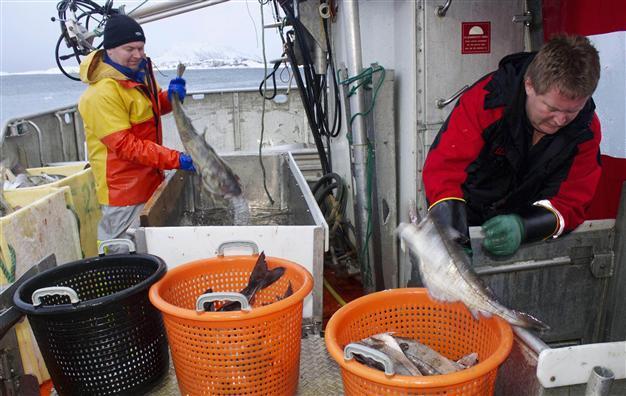Norway, Russia see cod boom despite worldwide overfishing
ABOARD HAUNES, Norwegian Sea - Reuters

Norwegian fishermen sort fish after a trip to catch cod in the Arctic Barents Sea is seen in this file picture. Cod quotas for 2013 are at a record high despite a crisis for world fish stocks. REUTERS photo
A cod bonanza off north Norway and Russia and also recovery of some fish stocks off developed nations from the United States to Australia have led many scientists to say the future for over-fished world stocks is a bit less bleak.Stocks off developing nations - from the Pacific to the Caribbean - are still in sharp decline but the recoveries give hope that the problems are not irreversible.
“The outlook is improving relative to what we saw in 2006,” said Boris Worm, a professor of biology at Dalhousie University in Canada who was the lead author of the 2006 study in Science.
Fisheries, both marine and farmed, provide livelihoods for up to 820 million people, according to the U.N.’s Food and Agriculture Organization (FAO), which emphasises that globally, over-fishing is still on the rise.
Cod, the 11th most caught fish species in an FAO list led by the Peruvian anchovy, skipjack tuna and Atlantic herring, has had a mixed fate. Part of the reason is that global warming has expanded the cod’s habitat northwards. And strict management of quotas by Oslo and Moscow have played a role, fisheries experts say.
Drop in cod prices
The boom in cod stocks off Norway and the drop in prices, caused partly by recession in key importers Portugal and Spain, has undermined efforts to farm cod as an alternative to preserve wild stocks. Fresh cod now costs far less than farmed fish.
Most revivals in fish stocks are in areas where only one or two nations set the rules, like off the United States or Australia, where stocks of prawns and tuna have risen.
“And the biggest gap is still fixing the high seas -- half the world’s surface,” said Amanda Nickson, director for global tuna conservation at the Pew Environment Group who said most successes were in national waters.
Global warming, meanwhile, is bringing all kinds of threats.
One study last year said fish would shrink in coming decades because of a lack of oxygen in warming waters.
And acidification caused by rising levels of carbon dioxide in the atmosphere could make it hard for creatures to form protective shells, disrupting marine food chains.
So far, though, only one semi-marine fish is known to have gone extinct, Worm said, the New Zealand grayling which lived in both rivers and the ocean.
For now, Norwegian fishermen are happy to enjoy their boom. Locally known as “skrei”, the cod swim south to coastal areas to spawn in vast numbers from January to April.
















